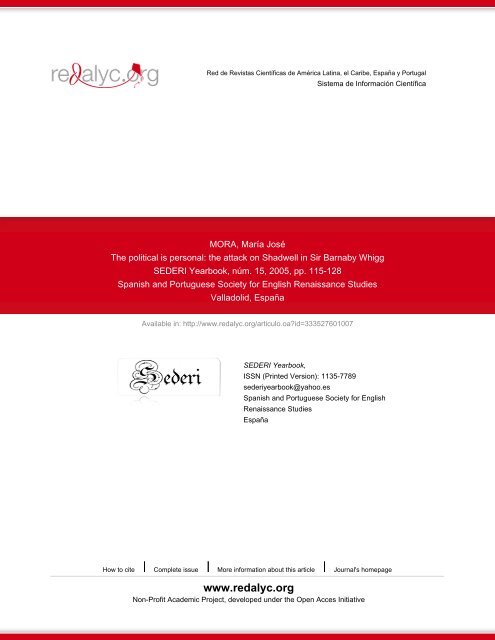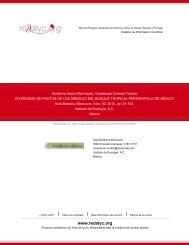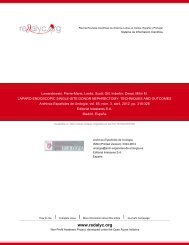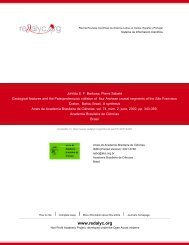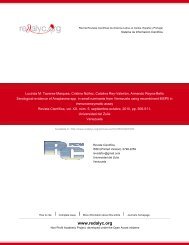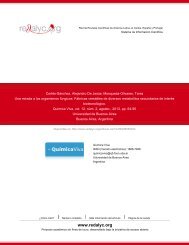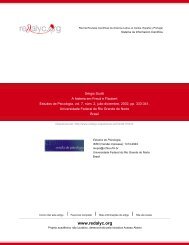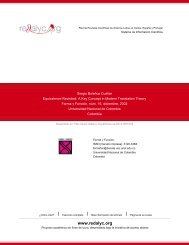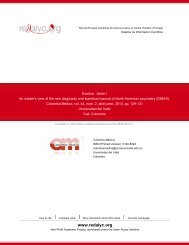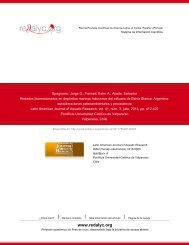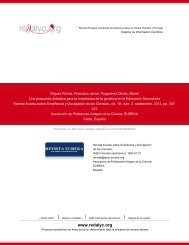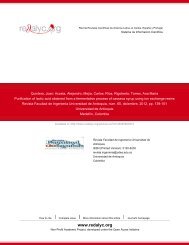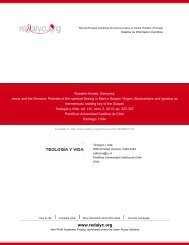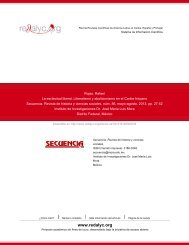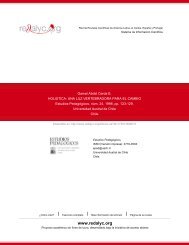Printed - Redalyc
Printed - Redalyc
Printed - Redalyc
Create successful ePaper yourself
Turn your PDF publications into a flip-book with our unique Google optimized e-Paper software.
Red de Revistas Científicas de América Latina, el Caribe, España y Portugal<br />
Sistema de Información Científica<br />
MORA, María José<br />
The political is personal: the attack on Shadwell in Sir Barnaby Whigg<br />
SEDERI Yearbook, núm. 15, 2005, pp. 115-128<br />
Spanish and Portuguese Society for English Renaissance Studies<br />
Valladolid, España<br />
Available in: http://www.redalyc.org/articulo.oa?id=333527601007<br />
SEDERI Yearbook,<br />
ISSN (<strong>Printed</strong> Version): 1135-7789<br />
sederiyearbook@yahoo.es<br />
Spanish and Portuguese Society for English<br />
Renaissance Studies<br />
España<br />
How to cite Complete issue More information about this article Journal's homepage<br />
www.redalyc.org<br />
Non-Profit Academic Project, developed under the Open Acces Initiative
The political is personal:<br />
th e attack on Sha dwell in Sir Barnaby Whigg<br />
Ma ría José MORA<br />
Lillillersity of Seuilu:<br />
ABSTRAer<br />
TI1e paper discuses tite importance of personal satire in the<br />
Restora tion plays of the Exclusion Crisis (1679-82), focusing on<br />
Tho mas Ourfey 's Sir Bnmn by W/ligg (1681). Although the caricature<br />
of the poet Thomas Shadwell in the figure of Sir Bam aby has been<br />
generally recognized, recent discussions o f the play have tended to<br />
downplay its reso nance and emphasize instead more general<br />
aspects of the political satire on the \Vhig party. However, the<br />
pol itical element in this comedy is nol central lo the plo l; iI is<br />
inlroduced mainly through a secondary character, whose main<br />
function in the play seems lo be only lo mock a rival poet who had<br />
made no sec ret of his commitmen t to the wh íg cause . Sínce Sir<br />
Samal1}! Wltigg was produced soon after the defeat of the<br />
Exclusionisls, Ihe attack on Shad well seems almost an afterthc ught,<br />
an addition designed to increase topi cal interest - on the wake of<br />
the controversy provo ked by 17JCLancnshirc Witchcs - and lo arouse<br />
par tisan supparl for the play.<br />
0 11 the wa ke of the anti -Catholic paranoia triggered by the Popish<br />
Plol (1678), England wen l through a period of a cu le political crisis:<br />
in 1679, the faction that around thi s lime carne lo be ca lled th e<br />
Wh igs in lroduced the firs l of three succ essive bilis lo excl ude lhe<br />
Ca tho lic Duke of York from the succession; bul the Kin g<br />
manceuvered lo frustrate their aim s, drawing on the s up porl of the<br />
so-called Tories and resorting to his prerogative to prorogue or<br />
dissolve Parliam ent.' But political controversy was not restricted to<br />
parliarnentary debale: it ex lended lo th e s lreels and popular<br />
meeting p laces, like clubs and coffee-houses, Th e thea tres also<br />
engaged actively in the political slri fe. Plays like Bancroft's The<br />
Trngedy of Sertorius (1679), Se ttle's Tite Feinole Prelate (16&) or<br />
Shad well's Tite Lancasttire Witcltes (168 1) at tacked Popery and<br />
1 Fora ccncee account oí the Exclusi ón Crisis, see for instance Harrt s (l 99Y &:>-11 6).<br />
it; ,¡"'ri '5 (2005: pp."5-28)
endorsed Whig ideals. Tory poels relalialed wi th works that<br />
denounced rebellion and exalted loyalty, like Tate's Tlte Loynl<br />
Gel/eral (1679) and The History of Kil/g Richan: tlte Secol/d (1681/82),<br />
Whilaker's The Conspimcu (1680), or Dur fey's The Roynlist (1682);<br />
once the Exclusior rists were de fea ted in 1681, the Whigs w ere<br />
mercilessly ridi cul ed in plays like Behn's Tlte Roundheads (1682) or<br />
Crown e's Ci/y Politioues (168) .<br />
One of the firsl comedies lo make comic capital of the<br />
Wh igs was 1110mas Durfey's Sir Bnm nby Wlligg, produced by the<br />
King 's Companv in October 1681. The play presen ts severa] love<br />
intrigues agai nst a background of plots and conspiracies w hich<br />
provides the occasion for ab un dan t mockery on the Wh igs nnd ,<br />
more particularly, a carica ture of 1110mas Shadwell in the tiLlecharacter:<br />
Sir Barnaby, a mem ber like Shadwell of the Wh ig Green<br />
Ribbon Club, is presented al the beginning as a loud -mout hed<br />
radical rebel :' but a l the first sign o f danger he tu rns his coat and<br />
betrays .1 11 his former friends. Although the identi fica tion between<br />
Sir Barnaby and Shadwell is generally rccognizcd , stud ics of thc<br />
theatrica l production of the Exclusi ón years - Roper (1989), Owen<br />
(199) , ' 996) - have d ownplayed the imporlan ce of persona l sa tire<br />
in the plays, arguing that such " particu la ris t approa ch" obscures<br />
the po litical sign ificance of the themes and tropes used by the po ets<br />
and "refuses lo acknowledge the bigger picture of drama tic and<br />
politícal shifts" (Owen ' 996: 27). In this line, Susan Owen reads Sir<br />
Bnm nby Wlligg as "a par tisan play, a Tory satire on the Whigs" in<br />
wh ich there are "sorne specific jibes a t Shadwell" (1996: '94)' Bu t<br />
the weigh t of these "specific jibes" needs lo be reassessed : the<br />
celebration of Tory triumph and ridiculing of the Whi gs are nol - as<br />
they are in Durfey 's subseq uent comedy, Tite Roynlist (1682) - part<br />
of the fabri c of the wo rk: in Sir Bnmnby, the who le subs tance of thc<br />
poli tical sa tire revol ves upon an element that is largely extraneous<br />
lo the plot: the carica ture of the riva l po et.<br />
It is true that the characterization of Sir Barna by borrows<br />
elemen ts frequently usen in anti-Whig propaganda , w h ich 15 not<br />
1 The Creen Ribbon Club had begun mee ting C.I6¡S at the Kmg's Head Tavern at<br />
Chancery Lane End . The Club was tho ught te be responsible for the Exdusionis t<br />
periodical A Wwkly PIlCqllrl (J! Aill'irl" [ mm Rt J1I/t:' and for the d tstrfbutíon o f ' ....'hig<br />
propaganda thrc ughou t the country. It also ccllabora ted in rhe organiza tion of the<br />
pope-burmng processíons held on the anmversary of the accession of Queen<br />
Ehzabeth (17 Nove mber ). See Harris (l99 J 84-8S)·<br />
116
surp nsmg if we bear in mind that Shad well was one of the<br />
playwrigh ts more closely associated with the Whig cause. Thus, Sir<br />
Barna by is defined in the Drnmntis personac as na Phanatical Rasca},<br />
one of Oliver's Knighls; one that always prelends to fear a change<br />
of Covem men t yet ci nes his best to cause O TlP . " ) Resides indicntin g<br />
the author's contempt for the cha racler (idenrified as a "rasca)" ), thc<br />
description d raws on the connn on partisan trope of presen ling the<br />
Whigs as the re-incarnat ion of the Roundheads, and associating<br />
them , therefore, wirh the ghost of the Civil War and the puritan<br />
republic; it also presents their professions of lovalism - their<br />
defen ce of English law and liberty - as hypocrit ical, iden tifying<br />
them w ith the spirit of sed ition. Th is portrait comes lo life as soon<br />
as Sir Bamaby makes his firsl appea rance on slage. He speaks wil h<br />
nosla lgia of "the blessed year of 48" (11) and resorls lo puntan<br />
rhetoric as he refuses lo kneel and bare his head lo drink the king's<br />
health: "Not I Sir, yo u musl spare me: I never kneel (not 1) but lo<br />
pray ... Sir, we never uncover, 'tis not OU T method; we never use<br />
any Ccrcmony" (11). His anti-monarchical stance rcndcrs him a<br />
trailor in the eyes of the other cha racters:<br />
SIRBA R~ABY : ... 1knew your Father long ago, M,. Wildíng; he was<br />
always a free, generous soul índ eed - but (betw íxl you and 1)<br />
would not be rul'd: he wou ld still be on the wrong side : Come,<br />
come, he 100"d the King too well: had he not lov'd the King, he<br />
had been a brave felIow.<br />
B ~ED I CK: Otherwíse called a Rasca!. (9)<br />
Yet, Sir Bamaby identifies the Whig cause wi th the true national<br />
spirit, and speaks of his party as the only guaranlors of p roperty<br />
and freed om: "1 can lell you, that if OUT soul-saving Party do not<br />
settle the Nalion, I say 'tw ill crack, 'twill unhinge - whi p, you're<br />
gon,old An tichrisl will ha ve YO UT Lands and Bodies, and the Devil<br />
YO\IT sou ls " (10).<br />
Besides these commonplaces, other fealmes are added lo<br />
turn Sir Barna by into the prolotyp ical Whig of Tory partisan<br />
w riting . Thus, el central eleme n t in this cha rac teriza tion is the<br />
" Other characters wi thin the play corroborate this descríption o f Sir Bamaby. See,<br />
for insta nce, the first references to hlm in act 1:<br />
BENEDICK: Whigg is hisname? Oh, I believe I know him, a huge fat fellow,<br />
one of Olivet's Knights.<br />
WI L.OI NC:Th e sam e, and the most busie, seditíous Coxcomb alíve . (9)<br />
" 7
allusion lo the greed of the Whi gs. In the fírs t act of the play<br />
Wild ing poinls lo the Whig claim that " theirs is the Church<br />
Militant," bul observes tha t in fact "Money is both their Cod and<br />
King " (9); Sir Bamaby himself confirms this view of the Wh igs as<br />
he says that his so n l is " alw avs in th e heart o f the City - in<br />
Lumba rd street" (JO), the slreel where go ldsmiths and Illon eylenders<br />
had their shops. Ind eed , later on in the play he appears<br />
willing lo change his religion for moneyr' in a rder to milrry a rich<br />
Turk ish heiress, he agrees lo tum Ca tholic first, and even Muslim in<br />
the end :<br />
SIR BAR..'JABY: ... \Vell, wel1, since it can 't be help't, 1'11 tum Turk,<br />
man, [e w, Moor, C raec ian, any thing: Pox on't, I'Ie not lose a lady<br />
and such a sum for the sake of any Religión und er the Sun, by<br />
Mahomet, no t I.<br />
SWIFT: Bul does nol yo ur Conscience prick you a Httle?<br />
SIR BAR.."I.JABY: Not a jot, faith. Why, you old fool, O UT Conscience is<br />
OUT lnterest always, and I have nol been a rebel so long SUTe lo<br />
have any squeamish fits al these years. (50)<br />
Sir Barna by, m oreo ver, associates h im sel f with th e corrup t practices<br />
and the manípulat ion of the London erowds attributed lo the<br />
Wh igs:'<br />
l'le go presently and corru pt my Men; some with bribes, some<br />
with promises and fair words, others with preferments: 'I'hen sow<br />
Sedition 'mongst the Mobile, win 'em with Pots of Ale, and Peny<br />
4 The aUusion to the change of re bgton may ind eed be a personal jibe at Shadwell. A<br />
few months after the performance of this play Shadwell was accused in a Tory<br />
pamphlet of being a "Papíst" and h3\' 11g been married by a "Poptsh pn est." His<br />
reply nppeared in J \\'hig publícation, 1711' ímpartíal Prolt'stllllt M",cllry (jan. 4 -27,<br />
1682); Shadwell reportedly denied lile accusa tion, though he admitted bavm g leaned<br />
" towa rd Popery for about etght Months (19 OI 20 Years síuce)." See Borgman (1m:<br />
55-56).<br />
s On the active t nvolvement of t he Londo n crowds in t he political strtfe of these<br />
years, see Harris 1987, esp. 1 5~88 . Although both Whigs and Torí es attempted to<br />
enltst the sllpport of the conunon people, the staunchly Protestant sympathies of the<br />
City mad e pro-wlug demonstrations much mor e consptcuous . Tory propagand a<br />
therefore accused the Whigs of cour ting the "rabble" and tnstígatíng rebelhon<br />
(Owen 1996: 149'"56). and ann-whtg plays often make this point; see, for íns tance,<br />
Lord Lambert's song in Behn's The RIlJ lt1l l}, t'(III~ (4.3-97-112), the Preface to Durfey's<br />
17w R(JYlllisl (1682), or the discovery of the "Tory" plot in Crowne's City Po/diques<br />
(+l.2S7-}I) ·<br />
118
Loafs, to com mít Ryots, Murders; there's your Polícy! J'le do't 1<br />
sayo(50)<br />
Whig paranoia, their chronic fear of plots and French in vasions, is<br />
a lso introduced in the caricature; thus Sir Barnaby is outraged to<br />
discover that his nephew, Sir Walter, has no weapons in the house<br />
to use in their own defence:<br />
SIR BAR'iABY: A eareless Villain - he shall nol own the blood of the<br />
Whiggs tha t neglecls his Counlrey thus: - ne'r a Musquel a Rogue<br />
- in this Popish Age too, and but one Sword, Ilay, and in a fam ily<br />
of sixleen People uprising and downlying - a Dog- a Rascal - bUI<br />
ene Swerd? ._. A Son of a \\'hore, ne'r a Dagger neither, nor a<br />
Case-knife sharp at end - nor nothing - not so much as a Penknife?<br />
(10)<br />
Creed, corrup tion, and coward ice are presented as the<br />
visible ma rks of a total lack of principIes. One of the gallan ls makes<br />
the point, as he says that Sir Barnabv will "in .111 turns of State<br />
ehange his Opinion as easily as his Coa t, and is ever zealous in<br />
Voting for that party that is mosl Powerful" (9). This impression is<br />
soo n eon finn ed. For a ll his ranting, Sir Barnaby is quiek lo defect<br />
frorn the Whig cause as soon as he believes there is real danger<br />
() .2); he nol only changes sides, bu l lum s in .1 11 his fonner friends:<br />
W ILDINC: ... The green Ribbon Club I find is now dispers'd: pray,<br />
where's yo ur late ftiend and brother Sir Miles Mutinous?<br />
SIR BARN A BY: IVhere? In Newgale.<br />
BENEDI CK: How! Newgale! IVho has Impeach't him?<br />
SIRBAR.'JABY: 1, 1myself, man: Impeacb't him! and more than that,<br />
intend to hang him the next Sessions .<br />
HD:EDICK: A fine, friendly, Christian-like Act, in troth.<br />
SIR BAR.\f ABY: Ay, Cad - friend or father in such a case: up they go<br />
to save my own neck: 1 don"t leve hanging, for my part - others<br />
mayo(40-41).<br />
Bul if these po inls may be comrnon in anli-Whig sa tire,<br />
there are other prominen t traits in the characterization of Sir<br />
Barnaby that are aimed particularly at Shadwell. Most conspicuous<br />
of them all is, obvíously, the character's physical size. Sir Barnaby is<br />
described in the pla y as "a big fat Iellow" (9) and he refers lo<br />
himself as "a Portly, ]olly, Fa t man: a ma n of Faith and Belly" (11).<br />
References to Shadwell's corpulence were a sta ple element in<br />
" 9
0 0 " He<br />
satirical a ttacks against hím: they would pursue him even after his<br />
death, as in the mock-epítaph wrilten by Tom Brown : " Heav'n, if it<br />
please, may ta ke his loyal Heart/ As for the rest, sweet devil, fetch<br />
a Ca rt" (Borgrnau 1969: 99). These allus ions often wenl logelher<br />
with jibes a l the poet's over-ea ting and , especiallv, drinking .<br />
Dryden, for instan ce, d evelops this image in the portrait of<br />
Shadwell as Og in the second par t of Absnlolll nlld Achit ophel (1682):<br />
Now stop your noses Readers, all and some,<br />
For here's a lun of Mídnight-wo rk lo come,<br />
Og from a Treason Tavern rowling heme.<br />
Round as a Globe, and Liqu or 'd e\" ry chink,<br />
Good ly and Creat he Sayls behin d his Link;<br />
With a 11 this Bulk there's no thing lost in Og<br />
Por e\"ryinch tha t is not Fool is Rogué."<br />
(Swed f'Tl be rB & Oea rinB '972 : 7;)<br />
Dmfey also makes the connection in this play; as Sir Barnaby<br />
expresses his d isI11c1Y that astrologers ha ve predicted el fam ine,<br />
Benedick observes: "This Epicu re I see never considers anything<br />
fur ther than the pleasures of eating and d rinking" (11). He<br />
reintrod uees the topic in the second act, when Wilding speaks with<br />
eonlempl of Sir Barnaby as "s woln and bloated " (19); this lime<br />
Dmfey exploils thc comic po tcn tial of this cha ractcr trai t, as Sir<br />
Barnaby takes offence and emphatically den ies wha t his physical<br />
presence on stage ma kes obvious: "1bloated ! what, because - I arn<br />
plum p, plump, a man of kidney or so - 1 bloated " (19). Dmfey<br />
insists again in act 5, as Sir Barnaby is accused of indulging in the<br />
sins of the flesh: "You are fu11 of sin, Son, Fat, fa1; \'ery Iat": he<br />
replies ind ignanlly: "Portly, portly, like the Ancien l British Race, a<br />
Vesse l of choice Wares, a Man of Kidney" (49)'<br />
Sir Barnabv also incorpo rales prom inen l fea tures<br />
associated wil h Shadwell's professiona l actlvity. He is presented by<br />
6 Dryden plays the same not e in his Vimlim tioll oftlte DI/ke {~· G ll j~ (1683): "Og may<br />
wríte against the King if he pleases. so long as he Drinks for him, end hís Wr itings<br />
will never do the Co ver nment so much harm , as his Drmking does it good: for true<br />
Subjects will not be m uch perverted by his Libels; but the w íne Duríes rise<br />
considerably by lus Claret 0 adds a mocking reference to the poet's fall al a<br />
popular tavem, The Old Devil: '11e broke no Ríbbs, because the hardness of the<br />
Stairs cou'd reach no Bones. and for my part, I do not wcn der how he carne to fall,<br />
for 1have always known him heavy : the Miracle ís, how he gOl "P agaín" (Dearing<br />
& Roper 1992: 32~30) .<br />
120
Wildi ng as "an audacíous and impudent libeller" (19) , allnd ing lo<br />
Shadwell's work as a pamphleleer for the Whig cause." Like<br />
Shadwell, he ta kes pr ide in his musical skills: "This fellow valúes<br />
himself exlremely by playing on the Musick" (10) , a commen t<br />
w hich seerns espec iallv sa rcastic coming fmm the pen o f a mas te r of<br />
song -writing such as Dnrfey." More no lorio usly, Sir Barnaby is<br />
made lo play a song that rid icules his theatrical pro d uction:<br />
Farew ell tny Lov'd Science, my fonuer deligh t,<br />
Moliere is quite rifled, then how sho uld I write?<br />
My fancy's grown sleepy, my quibling is don e;<br />
And design or invention , alas! I have naneo<br />
But still let the Town never d oubt my conditian;<br />
Though r fall a damn 'd Poet, I'le moun t a Musician .<br />
I go l Fam e by fil chin g from"<br />
Poems and Plays,<br />
Bul 111Y Fidlin g an d Drinking has lost me the Bays;<br />
Like a Furv I rail'd, Iike a Satvr 1writ,<br />
Thersites t;W Humour, an d Fleckno mv wu.<br />
But lo m"k~ some amend s for my snarlíng an d lashing,<br />
Idívert all theTown with my Thrummíng and Thrashing. (28)<br />
For all its brevi ty, the song is a thorough bash ing of<br />
Sha dwell as a poe!. Durfey clearlv makes comic capital of Drvden's<br />
infamous lampoon on Shadwell, as he porlray s Sir Bamaby as an<br />
incompetent playwright and associates him with Flecknoe." He<br />
allud es mockingly lo Shadwell's claim lo musical lalen l and lo his<br />
most successfnl comedy, TI/e Virluoso (1676), which Look the rise of<br />
70 n the pronunence acq uired by Shadwell as Whig pamphleteer in the early t680s,<br />
see Borgman (1969: 55).<br />
11 60th Shadwell and Durfey a ttached grea t importance to the use cf songs and muste<br />
in their plays, but Durfey's popularity in thís ñeld was unsurpassed . The DidiOlIllf)1<br />
of Nali01ll11 Biogm" IY allud es to an often quo ted anecdo te that "Charles 11 had leaned<br />
famil iar ly on his shoulder, holding a comer of the same shee t of music from wluch<br />
Dur fey was síngmg t he burlesqu e song.. ' Remember, ye whígs, what was fonnerly<br />
done.:" See aleo McVeagh (2000: 5) and Wheatl ey (2001 : )44).<br />
'1 M lcFlt'ck/Ult' was not published until October 1682, yet the poem had been written<br />
ell. 1678and had circulated in manuscr ipt (Swedenberg & Dean ng lCf72 : 299")00).<br />
121
the new experimen tal science as its cen tral theme." He also accuses<br />
h ím of plagiari zing, a jibe w hieh was com rnon in d isput es among<br />
poets; the a llusion to Mol iere in this cas e must have hit hem e, since<br />
Sha dwell ha d lifted seenes or w hole pl ots from him in severa ] of hi s<br />
ea rlv co rn ec{ies - TI", S/lII..II Loters (1668), TI", HYI'0crite (16(>9) TJ¡e<br />
Misa (1672) - and had taken pains in the Dedications of these plays<br />
lo d efend himself from sim ilar charges o f merely eopying from the<br />
Freneh poet." But the elemenl that Durfey seems lo ridicule rn ost<br />
poinled ly is Shadwell's identifica tion with the jonsonian m od el o f<br />
instructional sa tire: the comedy of humours, Th us, Shadwell's<br />
avowed purpose of exposing the vices of the tim e is transformed by<br />
Durfey inlo "snarling and lash íng" and railing "like a Fury" : m ost<br />
poinLed ly, his role as a sa liris t is presen ted, wilh a ve ngeance, as h ís<br />
"hum ou r" - that is, the "bias of the mind" (lo use Shadwell's 0""<br />
words) that makes a cha racter a coxcom b." To round o ff the<br />
caricatu re, this sa tirical humour is identified with the character o f<br />
Th ers ites, the clownish and q ua rrelsorne troublemaker in T J¡.. l liad<br />
who is takcn lo task by Odysseus for his ínsolcncc in abusing thc<br />
Greek lead ers.<br />
11,e relish wilh which Durfey hea ps ridicul e on Sha dwell 's<br />
poetic agenda clearly smacks o f more than political rivalry, Indeed,<br />
as Derek Hughes (1996) has poin led ou t, Durfey may have had<br />
sorne sco res lo se ttle with Shad we ll, w ho had pilloried him and his<br />
d ramatic prod uction in A Tril" Wino1V (1678). Shadwell had<br />
in lrod ueed in this play the cha racter of Yonng Maggot, described as<br />
"a n lnns of Cou rt-Man , w ho neglects his Law, and ru ns mad aft er<br />
Wil, prelending much lo Love, and bo th in spighl of Natu re, sinee<br />
10 There are other jíbes at the expense of t his play. Sir Barna by occastonally<br />
tncorpo ra tes by-word s characten snc of Sir Sam uel Hearty in '11k' Virtuoso, such as<br />
"písh", "whip" or " íucr", Sir Walter aloe introd uces a conuc echo of this play as he<br />
threa tens lo kill Townly, telling lum to prepare hiruself vto be dissected, ana tonu zed<br />
like a Chíchester Cock-Lobster, or so" (2 ) . On the dissection of the Chiches ter cock<br />
Iobster , see 1711" Virtuoso 1 .1.118-19, 1.1 . 247-48 aud 2.2.28) (Prieto- Pablos et sl. 1997).<br />
II Shadwell rephed te accusa tions of plagtarí ztng r...Ioliere in the dedícations te 111t'<br />
SIIJ1t''' [,mlt'rs and 111e Mj~ r . 111t' JlYl lf.lCrite apparently did not succeed on stage and<br />
was never pubhshed.<br />
u In the epilogue to J11t'H I I11 /(1 r i~ s (16]"1 ) Shadwell d efined Humour as foll ows: ..A<br />
Hum or is the Bvas of the Mind , I Bv which with violence ' lis one wav ínclin'd : l it<br />
makes our Actions lean on one side'stíll, I And in a l1 C hanges that \~ay bends the<br />
will" (Surnmers ' 927 1: 254)' Shad well d efended the use o( humours in comedy in<br />
the dedications to most of his plays, beginning with 171t" SI/IIt·u 1 ~ 1l lt'r s , and 171t'<br />
J11I/11f1rists.<br />
122
his Face makes h ím un fit for one, and his Bra ms for the other"<br />
(Sununers y 287)' Hughes contends tha t th is "obsessive poetast er"<br />
is a caricatu re of Durfey, "being sim ilar ly ugly, and ha ving<br />
sim ilarly deserted law for the pursuit of poetry" (1996: 221); he also<br />
observes tha t act '1 of A Trile iNMolO is set in the playhouse, whe re<br />
the characters watch a sex comedy which is "a malicious parody"<br />
of Durfey 's inunenselv successful A Fond HIIsbnlld (1 677)."<br />
Although Hughes is in good measure right, his<br />
obse rvation s can be further refined . The attack on Durfey is clea r<br />
bul his id en tification of Young Maggol wilh Durfey is debatable:<br />
Young Maggo t does not presen t himself as the au tho r of the play<br />
the cha racters attend in ac t 4, but as the poel's patron: the play, he<br />
says, is "one Pricketl 's, Poel Prickett " (y 334)." Inlereslingly<br />
enough, "Poet Prickett" is a nicknarne tha t was also associated w ith<br />
Durfey a few years later in a pamphlet criticiz ing his comedy The<br />
Mnrringe-Hnter Mntc/¡'d (1692)." As for the fragmen tary playwi<br />
th ín- the-play, it is clearly a parody of the sex eomedy which was<br />
in \'oguc in thc 16705. Although Sha dwcll may be aiming al scvcral<br />
works in this parodv, the action does resemble Durfey's A FOI1l!<br />
Husband in so rne crucial d eta ils: there are two lo vers cornpe ting for<br />
the favours of a m arried wom an, a husband who attempts to<br />
surprise his wife in the act, and a farcica l episode in which a lover<br />
hides under a table an d is discovered as the table is acc íden tally<br />
overturn ed . 111e table-episod e is especial1y signifiean l; Shadwel1<br />
uses il nol only lo ridicule Durfeys play - m aking nol one, bu t two<br />
" Contemporary sources agree on the success of A I~)//d J1usbmld. Langbame refers to<br />
this play as "one of [Durfey's] bes t Comedies," and notes that it had been<br />
"frequently acted wíth good App lause" (16g1: ISo). Downes observes that the play<br />
" took extraordinarily well" (1928: :;6), and Steele recorded that the comedy "was<br />
honoured with the pr(""...ence of King Charles the Second three of its ñrst ñve rughts"<br />
(71wGlIIlrtiiI11l, 15 juue 171)) .<br />
'4 It is true, hcwever, that total ccincidence is no t necessar v to make the caricature<br />
work. S had well's rítle-character in 111~ Viril/O...' does not fuÍly correspond to Robert<br />
Hooke; for one thing, Hooke was a prominent member of the Royal Society, whereas<br />
we are told in the play that Sir Nicholas was refused admissíon. Yer Hooke c1early<br />
saw himself personared in the comedy and , more stgntñcantlv, felt that e\'eryone in<br />
the eudience idenrified him with Sir Nicholas. See Pneto-Pablos rl 111 (1997: xxxiixxxí<br />
v).<br />
' 5 P llt'tll illfil1llis, or, A I..lrl IHlt ln,rth l/1wgi"S: Ilf'illg 11 ¡Jilllogw" llt'twt't'll LysI1111n Vlll f'lIt i"f',<br />
mili ,..Jrl J1rieket (1692). The title page attributes the authorship to Olarles Gildon. but<br />
this is questionable. Gildon had written a long commendatory Ietter ,...hich was<br />
publishe-d toge ther with the play.<br />
12)
lovers hide under the table - bu t also to highlight his contempt for<br />
Durfey's conception of comedy. In the prologue lo A FOI/tI HlIsbmul,<br />
Om fey had defended the preeminence of plot and design over wit<br />
and conversation:<br />
lf Plot and Bus'ness Comical and New ,<br />
Could please the Criticks that sit here lo view,<br />
The Poet mtght have thought this Play would do.<br />
But in this Age Oesign no praise can gel :<br />
You el)' it Conversation wan ts, and \Viti<br />
As if tite Obvious Rulesuf Comedy,<br />
\Vere on ly du ll Grimace and Repartée .<br />
Such, Sirs, have been your Darlings prov'd of late:<br />
The Author therefore careless of his Pete, <br />
And knowing Wit a Chattle hardly got,<br />
Has ventut'd his whole Stock upon a Plot. (1-11)<br />
Shad well obv iously had these lines in mind as he w rote the<br />
Dedication o f A T rile ~\'idmv. He is clea rly pointing to Durfey w hen<br />
he refers to "the Hule Poetasters of the fourth Tate" who hold "tha t<br />
Wit signifies nothing in a Comedy; but the putting out of Candles,<br />
kíckíng down of Tables, fallíng over [oynt-stools, impossible<br />
accidents, and unnatural mistakes, (which they 11105t absurdly call<br />
Plot) are the poor lhin gs they rely upon" (Summers 1927 3: 284)".<br />
There is a tradition abou t Durfey that holds that he was<br />
slow to take offence. The Dictionaru of Nntionnt BiogrnpllY, for<br />
inslance, claims tha t "he was ullerly devoíd of malice, his sa tirical<br />
spirit wa s mirthful and never revengefu l" and po ints out that when<br />
bitterly lampooned by Tom Brown in ' 689, he "made no angry<br />
rejoinder but took the abuse as a joke." In a recent s tudy of the poet,<br />
John McVeagh concu rs: "Du rfey took such ab use in his stride "<br />
,6 Christopher Wheatley finds in Shadwell and Durfey "li ttle personal amm us<br />
against each oth er." His conclusión is based on what he sees as "S had well's<br />
awareness that Durfev wa s beneath lum, not merelv in rank and aclríevement, but in<br />
terms of dramatic subjects. Shadwell wro te comedy , and Durfey frequen tly wrote<br />
the lowest subcategory of ccmedy , farce" (200 1: )44). But such awareness must have<br />
made the success of inferior dramatic forms all the more galling: A Trile Widllw<br />
fatled: A Fmul ll llsblllulremained a favourite.<br />
' 24
(2000: 14).'7 Yet, before he produced the carica ture of Shad well in<br />
Sir Bom oby Whigg, he had already singled ou l this poel among<br />
more prominen l Whigs in the sa tire Tite Progress o" HOllesly (1681),<br />
and would do so again in ScO/ulohm/ Mogllolllm; Or, Pot0l'ski's Cose<br />
(16fb), in which polirical
portends fulure successes, though sorne fat Whiggs of Sir<br />
Bamaby's tríbe made all the interest they could lo cry it clown.<br />
By introducing the caricature in the play, Durfey also<br />
capita lizes on the scanda l provo ked by Shadwe ll's The Lancashin:<br />
Witclles, slaged only a couple of mon ths before.' He cerlainly<br />
makes th e con necrion betw een hoth plays clear: Sir Rarnilht s<br />
family is associated with Lancashi re - his nephew, Sir Walter, is<br />
described in the Drnmmis perso1lal? as "an Opinionated Fool and<br />
Cuckold : A Lancashi re-Knigh t." If Shadwell used his play lo<br />
defend Whig ideals and a ttacked both the Anglican Church (in lhe<br />
character of the cha plain Sm irk), and Ihe Ca tholic (in Teague<br />
o'Divelly, the Irish pri est), Durfey ridicules his rival's s tance 1110 St<br />
effective ly as he makes Sir Barna by recant on stage, 111e scene in<br />
which the actor impersona Ling Shadwell appears d ressed as -81, that ts, from autumn 16& to<br />
sununer 1681; seeOwen 1
References<br />
Behn , A. 1996 (1682): T1Ie Rouudheods. T1Ie Works of !lp/lra Behu. Vo1.6. Ed. j.<br />
Todd . London: Pickering.<br />
Borgman, A.S. 1969: Thomne Slwdwd/ : His Lijc nnd Comedies. New York:<br />
Blom.<br />
Crowne, j. '967 (1683): Cily Po/itiql/es. Ed. j. Harold Wilson. London:<br />
Edward Am old .<br />
Dearing, V.A. and Roper, A. (eds .) ' 992: '111e Works of jollll Drvden, Vol. '4.<br />
Berkelev: Univers itv ofCalifornia Press.<br />
Dictionory oi Noííonol ' Biograp1ly 011 CD·ROM ' 995: Ox ford: Oxford<br />
Uníversity Press.<br />
Downes, J. 1928 (1708): Roscius Aug/icmms. Ed. M . Summe rs. London:<br />
Fortun e Press.<br />
Durfey, T. 1677:A Fond Huslmnd;or, TI/e Plotting S;slus. London.<br />
_ .1691: LolXfor MOlley;or, T1Ie Boarding Se1l001. London.<br />
_ .1682:T1Ie Royali'/ . London .<br />
_. 1682: Scandoíum Mngnatll1lJ; or, Potnpski's Case; A Satyr agniust Polish<br />
Opprcsion, London.<br />
_ . 1681: Sir Bamaby Whigg;or, No Wit Likca Womall 's. London.<br />
Harri s, T. 1987: London Crouxts in íhe Rrígn of Charles íl: Propaganda and<br />
Po/itics frolll the Rcstorntioll unííl 11u: Exclnsíon Crisis. Cambridge:<br />
Ca mbridge Un iversity Press.<br />
_<br />
. ' 993' Polities undcr 11Ie Latcr Stl/arts: Party Conflict in a Diuided Socie/y,<br />
1600- 1715. Harlow: Longman.<br />
Hugh es, D. 1996: EI/gli,1I Drama, 1660-'700. Oxford: Clarendo n.<br />
Langbaine, G. 1691: Al1 ACCOlll11 oflhe El1glish Dranunic Poels. London.<br />
McVeagh , j. 2000: Thomas DlIlfey and Restoratiol/ Drama: T1Ie Work of a<br />
Forgoncn Writer. Aldershot : Ashgate.<br />
Owen, S. J. 1993= "Interpreting the Politics of Restoratíon Drama." TI/c<br />
Scocnteeníh CClltury 8:67-97.<br />
_. 1996: Restorntioll Theaíre nnd Crisis.Oxfo rd: Clarendo n.<br />
Prieto-Pablos, j.A. et al. (eds.) ' 997' Thomos S1Iadwel/: TIIe Virllloso. Sevilla:<br />
Publicaciones de la Universidad de Sev illa.<br />
Roper, A. 1989: "Drawíng Parallels and Making Applications in<br />
Restoration l.iterature." Politics as Rej 1cctcd ;1/ Litcratllrc. Ed. R.<br />
Ashcraft. Los Angeles : \ViIliam Andrews Clark Memorial Líbrary. 29<br />
65·<br />
Summers, M. (ed.) '927: TIIe Complete Works of Thonms Shnduxll, London:<br />
Fortune Press.<br />
Swedenbe rg, H.T. and V.A. Dearing (eds.) '972: Thc Works of jolm D"!ldcll.<br />
Vol. 2 . Berkeley: University of Califomia Press.<br />
Van Lennep .l. (ed.) 1965: TIIe Loudon Slage: 1660- 1700. Carbonda le:<br />
Southe rn lI1inois University Press.<br />
lVilson, j. H. 1964: Mr. Coodmon, ttse Player. Pittsburgh : University 01'<br />
Pittsburgh Press.<br />
127
Wheatley, e j . 2001: "Who Vices Dare Explode ': Thomas Shadwell,<br />
Thomas Durfev and Didactic Drama ofthe Restoration." Ed. S. Owen.<br />
A Compon ían t~ Rceromuon Drama. Oxford: Blackwell. 340-)4 .<br />
128


